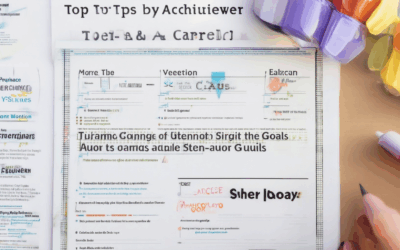In today’s fast-paced and ever-evolving world, self-discipline has emerged as a cornerstone of personal growth and success. Whether it’s maintaining consistency in professional endeavors, fostering healthy habits, or overcoming everyday challenges, the ability to develop self-discipline is a vital skill that empowers individuals to thrive. This article delves into actionable strategies, real-life applications, and insights designed to help readers cultivate self-discipline, regardless of their background or circumstances. From understanding the fundamental principles of self-discipline to exploring practical methods for building strong habits, this comprehensive guide offers a wealth of knowledge and inspiration to help you stay focused and motivated. By embracing the power of self-discipline, you can unlock your full potential and create a life that reflects your highest aspirations.
Key Takeaways
- Define Your Purpose: Reflect on your long-term goals and align daily actions with your ‘why’ to build discipline.
- Set Measurable Goals: Break objectives into manageable tasks to reduce overwhelm and increase success rates.
- Create a Supportive Environment: Surround yourself with positive influences and eliminate distractions to enhance focus.
- Start Small and Consistently: Begin with tiny, manageable steps to build momentum and strengthen discipline over time.
- Set Clear Goals: Define and regularly review objectives to guide actions and maintain focus.
- Develop a Routine: Establish a structured daily routine aligned with goals, prioritizing tasks based on importance and urgency.
- Practice Self-Control: Manage emotions and impulses, replacing negative habits with positive ones to maintain self-command.
- Stay Accountable: Hold yourself responsible, track progress, and learn from mistakes to improve and strengthen resolve.
- Continuous Improvement: Embrace lifelong learning and growth, remaining open to feedback and adjusting approaches as needed.
- Practice Gratitude: Shift your mindset towards abundance by reflecting on daily thankfulness, fostering a positive attitude.
- Limit Distractions: Reduce interruptions by turning off notifications and finding a quiet workspace to maintain focus.
- Be Kind to Yourself: View mistakes as growth opportunities rather than obstacles, treating yourself with compassion.
- Track Progress: Celebrate milestones to boost morale and reinforce the value of discipline.
- Seek Support: Surround yourself with encouraging friends, family, or mentors to stay motivated and committed to goals.
- Embrace Lifelong Learning: Pursue ongoing education and growth, staying open to new knowledge and opportunities.

How to Develop Self-Discipline
Developing self-discipline is a journey that requires patience, consistency, and a clear understanding of your goals. Here’s a structured approach to help you cultivate this essential skill:
- Set Clear Goals:** Define your objectives and priorities. Whether it’s personal, professional, or both, having a clear vision helps you stay focused and motivated.
- Create a Structured Plan:** Establish a daily routine or schedule that aligns with your goals. Consistency in your actions will help you build momentum and stick to your plans.
- Break Down Tasks:** Divide larger goals into manageable, smaller tasks. This approach reduces overwhelm and makes it easier to track progress daily.
- Stay Accountable:** Find an accountability partner or use tools like apps to log your habits and achievements. This keeps you motivated and on track.
- Practice Mindfulness:** Take time each day to reflect on your accomplishments and areas needing improvement. This self-awareness can enhance your decision-making and focus.
- Learn from Setbacks:** Embrace challenges as opportunities to grow. Maintain a positive mindset, practice gratitude, and celebrate small victories to stay resilient.
- Seek Support:** Surround yourself with individuals who inspire and motivate you. Their commitment to their goals can be a powerful source of encouragement.
- Maintain Healthy Habits:** Prioritize exercise, adequate sleep, and a balanced diet. These factors contribute to physical and mental well-being, which supports discipline.
- Evaluate and Adapt:** Regularly assess your progress and adjust your strategy as needed. Flexibility is key to sustaining long-term discipline.
What Are the 5 Steps to Help You Achieve Self-Discipline?
- Set Clear Goals: Begin by defining specific, measurable objectives. Whether it’s personal development, career advancement, or health-related goals, having a clear vision helps you stay focused and motivated.
- Create a Consistent Routine: Establish a daily schedule that aligns with your priorities. Consistency builds habits, making self-discipline easier to maintain over time.
- Track Your Progress: Keep a record of your achievements and challenges. Reflecting on your progress helps you stay accountable and identifies areas for improvement.
- Embrace Failure as Part of Growth: Understand that setbacks are inevitable. View failures as opportunities to learn and adapt, rather than as final outcomes.
- Seek Support and Accountability: Share your goals with trusted friends, mentors, or a coach. Their encouragement and guidance can significantly boost your commitment to self-discipline.
By following these steps, you can cultivate the self-discipline needed to achieve your aspirations and live a more fulfilling life. Remember, consistency and patience are key to long-term success.

What Are the 5 Key Aspects of Self-Discipline?
The foundation of self-discipline revolves around five essential components that guide individuals toward achieving their goals and maintaining personal growth. These pillars are interconnected and work synergistically to foster resilience and success.
- Acceptance
- Acceptance is the cornerstone of self-discipline, allowing individuals to recognize their current reality and work within it. It involves acknowledging strengths and weaknesses, understanding limitations, and embracing change.
- Tips: Practice mindfulness to better understand your situation and remain open to new perspectives.
-
Willpower
- Willpower is the driving force behind sustained effort. It enables individuals to stay committed to their objectives despite distractions and challenges.
- Tips: Set clear, achievable goals and track your progress to reinforce motivation and accountability.
-
Hard Work
- Hard work is often misunderstood as mere physical exertion. In the context of self-discipline, it refers to dedicated effort, attention to detail, and a willingness to invest time and energy into personal growth.
- Tips: Establish a consistent routine and avoid seeking quick fixes or shortcuts that compromise quality.
-
Industry
- Industry refers to the proactive pursuit of knowledge, skills, and opportunities. It involves a mindset that values lifelong learning and adaptability in a dynamic world.
- Tips: Surround yourself with inspiring individuals who challenge your thinking and push you to grow.
-
Persistence
- Persistence is the ability to endure challenges and maintain focus on long-term objectives. It requires unwavering commitment and the courage to keep moving forward despite obstacles.
- Tips: Celebrate small victories to stay motivated and remind yourself of your purpose when progress seems slow.
By mastering these five aspects of self-discipline, individuals can unlock their potential and create a life that aligns with their values and aspirations.

Step #1 to Develop Self-Discipline
Developing self-discipline begins with setting a clear and achievable purpose. Without understanding your “why,” it’s challenging to stay motivated. Take a moment to reflect on your goals and align your daily actions with them.
- Define Your Purpose: Reflect on your long-term goals and identify what drives you. Understanding your “why” provides the foundation for discipline.
- Set Measurable Goals: Break down your objectives into smaller, manageable tasks. This approach reduces overwhelm and increases the likelihood of success.
- Create a Supportive Environment: Surround yourself with positive influences and eliminate distractions. A conducive setting enhances focus and commitment.
- Start Small and Consistently: Begin with tiny, manageable steps rather than overwhelming tasks. Consistency builds momentum and strengthens discipline over time.
For further reading on building habits and maintaining focus, explore these resources:
- Understanding Self-Improvement Habits
- Mastering Concentration Techniques
- Effective Discipline Strategies
What Are the 5 Steps of Discipline?
Here are the five essential steps of discipline, designed to foster growth, consistency, and success:
- Set Clear Goals : Begin by defining your objectives. Whether personal or professional, having a clear vision helps guide your actions and keeps you focused. Write them down and regularly review them to stay on track.
- Develop a Routine : Create a structured daily routine that aligns with your goals. Consistency is key to building discipline. Prioritize tasks based on importance and urgency, and stick to your schedule despite distractions.
- Practice Self-Control : Learn to manage emotions, impulses, and reactions. Recognize when you’re tempted to take shortcuts or give in to indulgences. Replace negative habits with positive ones to maintain self-command.
- Stay Accountable : Hold yourself responsible for your actions and commitments. Track your progress and be honest about your mistakes. Use these experiences to improve and strengthen your resolve.
- Continuous Improvement : Embrace lifelong learning and self-enhancement. Seek out new knowledge, skills, and opportunities for growth. Stay open to feedback and willing to adjust your approach as needed.
By following these steps, you can cultivate a strong sense of discipline that drives success in all areas of life.

How to Train Yourself for Discipline
Discipline is a cornerstone of personal growth and success. Developing self-discipline allows you to overcome challenges, stick to goals, and maintain a healthy lifestyle. Here’s how you can cultivate it effectively:
-
Set Clear Goals
Start by defining your objectives. Whether it’s completing a task, adopting a healthier diet, or improving a skill, having a clear target gives you direction. Write them down and review regularly to stay focused.
-
Create a Routine
Consistency is key. Establish a daily routine that includes time for work, exercise, relaxation, and sleep. Stick to it even on days when motivation wanes, as consistency builds momentum.
-
Practice Gratitude
Gratitude helps shift your mindset from scarcity to abundance. Take a few minutes each day to reflect on what you’re thankful for. This habit fosters a positive attitude, which strengthens self-discipline.
-
Limit Distractions
Identify and eliminate distractions that hinder your progress. Turn off notifications, find a quiet workspace, and minimize interruptions to maintain focus and concentration.
-
Be Kind to Yourself
Understand that perfection isn’t the goal. Mistakes and setbacks are part of the journey. Treat yourself kindly and view challenges as opportunities to grow rather than obstacles.
-
Track Progress
Keep track of your achievements, no matter how small. Celebrate milestones to boost morale and remind yourself of your progress. This reinforces the value of discipline.
-
Seek Support
Surround yourself with supportive friends, family, or mentors who encourage your efforts. Their positive influence can motivate you to stay committed to your goals.
Remember, discipline is a skill that improves with practice. By consistently applying these strategies, you’ll develop stronger habits that support your personal and professional growth. Explore more tips on self-improvement and discipline techniques to enhance your journey.
Conclusion
Training for discipline is a lifelong process, but with dedication and the right strategies, you can achieve lasting change. Stay focused, embrace consistency, and celebrate your progress to unlock greater potential within yourself.




0 Comments